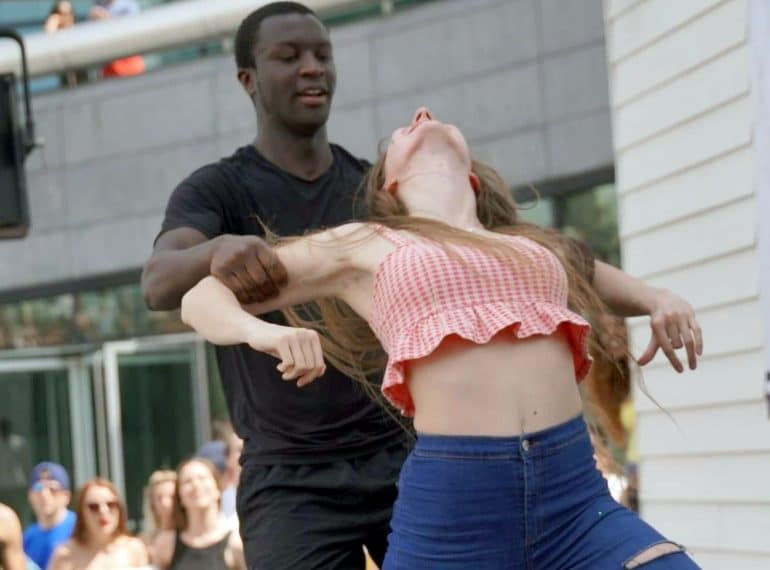
Eleven years after he left the School, Electrum Anpitan’s life is as varied as it is full.
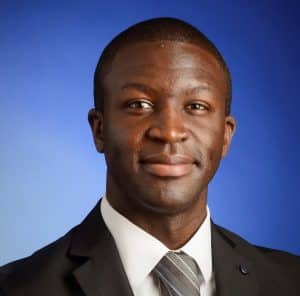 Electrum (OE 2001–2008) manages to fit in his demanding role as a Forensic Analyst for KPMG with extensive work in the local community and with running a dance business that has led to collaborations with some of the most famous Latin dancers in the world.
Electrum (OE 2001–2008) manages to fit in his demanding role as a Forensic Analyst for KPMG with extensive work in the local community and with running a dance business that has led to collaborations with some of the most famous Latin dancers in the world.
His community work includes promoting increased knowledge and understanding of the Bible; as he has done for many years, Electrum continues to give regular public discourses to large audiences, as well as teaching on a one-to-one basis.
Working, by his own estimation, 15-20 hours a day “pretty much every day of the week, all year round”, Electrum has no regrets about following the advice of his Headmaster, Dr John Marincowitz, to “get stuck in”.
While at QE, he was variously First Form Captain, Games Captain, Colt Lieutenant and Senior Lieutenant. He was involved in chess, debating and peer mentoring, and gained several commendations and bursary awards, including the John Owen Prize for House Service.
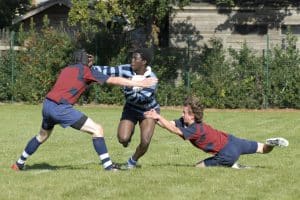 Involved in several sports teams, he counts among his proudest memories “scoring the winning try against Haberdashers’ whilst playing for the First XV”, which he had joined in Year 11.
Involved in several sports teams, he counts among his proudest memories “scoring the winning try against Haberdashers’ whilst playing for the First XV”, which he had joined in Year 11.
On leaving QE, Electrum went to King’s College London to read Physics.
In the intervening years, he has:
- Returned to the School in 2010 as Guest of Honour at Junior Awards while still an undergraduate;
- Become a qualified party wall surveyor – “I have extensive experience in this industry due to some business connections that were successfully explored,” he explains. He joined the Chartered Institute of Architectural Technologists, before eventually leaving to focus on his work in financial services and the Arts;
- Undertaken work experience for the government of Ghana, working on its Land Administration Project – liaising with several UN dignitaries. “[This came about] because of a business connection made whilst I was still at QE, actually. Hopefully this will encourage the current boys to keep their eyes, ears and minds open for any suitable opportunities that may present themselves, and to realise they are never too young to demonstrate an entrepreneurial spirit!”
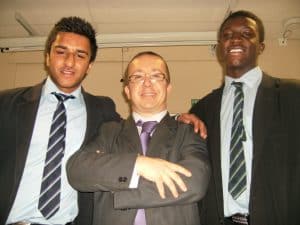 KPMG Forensic focuses on helping clients reduce reputation risk and commercial loss. His career in its London offices involves international work in areas such as: fraud risk management, anti-bribery and corruption, anti-money laundering, investigations & compliance, forensic technology, contract governance and intellectual property.
KPMG Forensic focuses on helping clients reduce reputation risk and commercial loss. His career in its London offices involves international work in areas such as: fraud risk management, anti-bribery and corruption, anti-money laundering, investigations & compliance, forensic technology, contract governance and intellectual property.
It is, he says, “an extremely rewarding and challenging field of work which makes a tangible difference to real-life situations in the business world and in people’s lives. There exists an excellent business network, and the work itself provides exciting opportunities to participate in newsworthy, high-profile cases.
“Working for a Big Four firm, I encounter QE alumni every month. It’s empowering to exchange success stories and have a ready-made network to give you an advantage over your competition,” he says.
His aims for the future include qualifying as an Accredited Counter Fraud Specialist and securing “a secondment in a financial services/law firm to broaden my practical experience”.
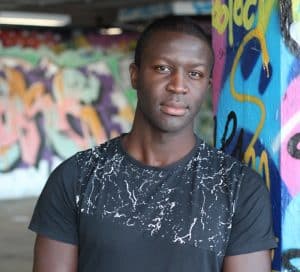 Alongside that demanding career, Electrum relishes the challenge of running his dance business, which offers its services to corporate, commercial and domestic clients. There have been performances in front of hundreds, he says, including celebrities and other notable figures, such as Sir David Attenborough, Mayor of London Sadiq Khan, TV presenter Kate Humble and singer-songwriter Sofia Karlberg.
Alongside that demanding career, Electrum relishes the challenge of running his dance business, which offers its services to corporate, commercial and domestic clients. There have been performances in front of hundreds, he says, including celebrities and other notable figures, such as Sir David Attenborough, Mayor of London Sadiq Khan, TV presenter Kate Humble and singer-songwriter Sofia Karlberg.
“Though physically very demanding, this area of my activities is particularly enjoyable not only for the pleasure and exhilaration that I derive from it, but also because I am able to tutor and assist others (from a wide range of backgrounds) who aspire to improve their dancing skills, to express themselves and connect with others in life-changing ways that they never thought possible. My approach to dance is that it is more than mere movement or rhythm – it is a medium inviting one to strive for consummate artistry and expressive beauty.”
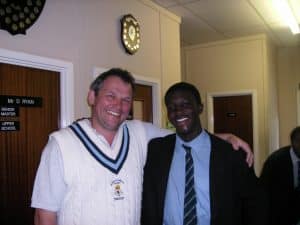 In addition to the time he spends teaching the Bible, his community work takes in mentoring young people in challenging circumstances and helping with construction projects that benefit the community.
In addition to the time he spends teaching the Bible, his community work takes in mentoring young people in challenging circumstances and helping with construction projects that benefit the community.
Reflecting on what he has learned over the past decade, Electrum has two further pieces of advice for current pupils at the School: “Never be intimidated by senior staff in the workplace. If they are worth their salt, they will value your insights!” and “Your career starts the moment you join QE, so plan ahead – secure some work placements during your GCSEs, A-levels and degree courses.”

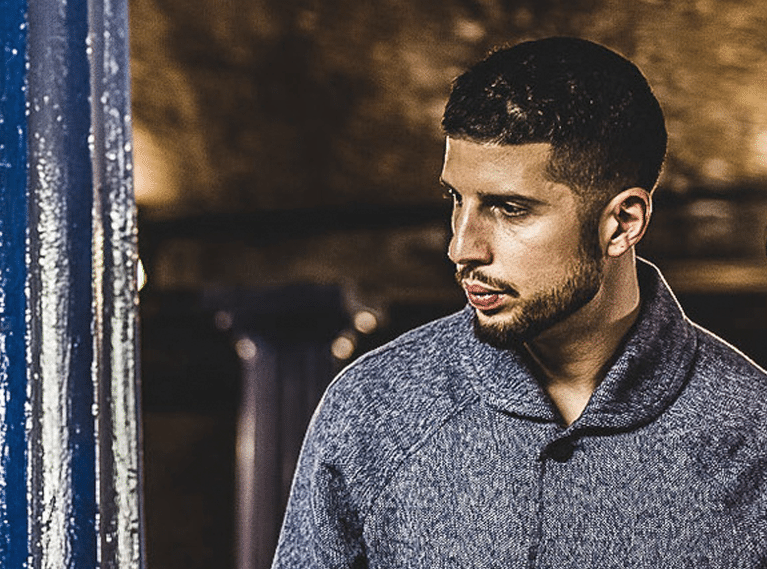
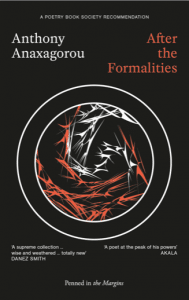 After the Formalities, a collection of poems by Old Elizabethan Anthony (1994–1999) was selected by the judges among the nominees for the £25,000 prize, the UK’s most valuable poetry award.
After the Formalities, a collection of poems by Old Elizabethan Anthony (1994–1999) was selected by the judges among the nominees for the £25,000 prize, the UK’s most valuable poetry award.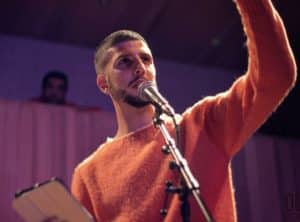 “In an excellent year for poetry, the judges read over 150 collections from every corner of these islands, and beyond,” said Mr Burnside. “Each had its own vital energy, its own argument to make, its own celebration or requiem to offer, and we knew that settling upon ten from so many fine books would be difficult. Nevertheless, as our deliberations progressed, the same titles kept coming to the fore.”
“In an excellent year for poetry, the judges read over 150 collections from every corner of these islands, and beyond,” said Mr Burnside. “Each had its own vital energy, its own argument to make, its own celebration or requiem to offer, and we knew that settling upon ten from so many fine books would be difficult. Nevertheless, as our deliberations progressed, the same titles kept coming to the fore.”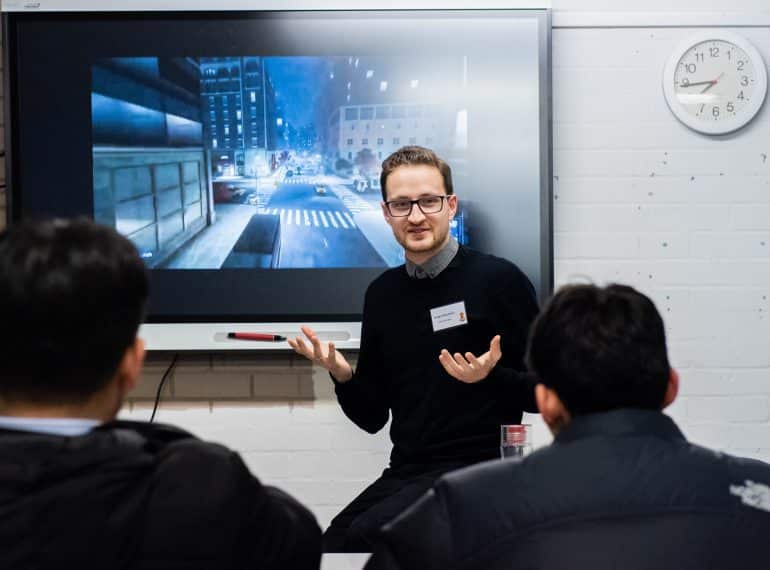
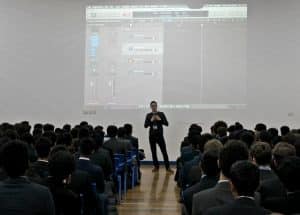 But, he told the boys, he had no regrets about his chosen path, since it had put him in control of what he was doing. He loves practising music six-to-eight hours a day as he finds it therapeutic and it gives him direction. He had been true to himself, his career giving him opportunities to learn from, helping him to mature and making him happy. “It’s more about the journey, rather than the end game. Every day I get a little bit better at something, I progress.
But, he told the boys, he had no regrets about his chosen path, since it had put him in control of what he was doing. He loves practising music six-to-eight hours a day as he finds it therapeutic and it gives him direction. He had been true to himself, his career giving him opportunities to learn from, helping him to mature and making him happy. “It’s more about the journey, rather than the end game. Every day I get a little bit better at something, I progress.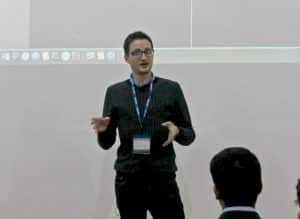 He is a regular supporter of the School and gave a presentation on sound design in video games at last year’s Year 11 Careers Convention.
He is a regular supporter of the School and gave a presentation on sound design in video games at last year’s Year 11 Careers Convention.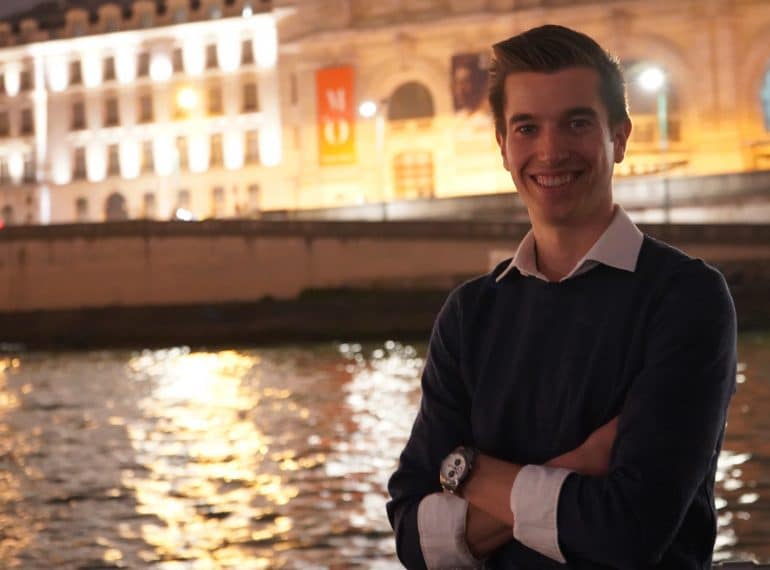
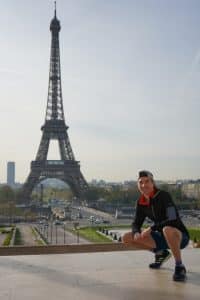 In one period, he held meetings in an aircraft hangar full of disassembled private jets, just outside Paris, while at other times he was to be found variously: wandering around downtown Abu Dhabi at 2am; eating out in Sao Paolo; running around Central Park whilst the sun set on New York, and spotting the world’s largest sail ship whilst walking the streets of Gibraltar.
In one period, he held meetings in an aircraft hangar full of disassembled private jets, just outside Paris, while at other times he was to be found variously: wandering around downtown Abu Dhabi at 2am; eating out in Sao Paolo; running around Central Park whilst the sun set on New York, and spotting the world’s largest sail ship whilst walking the streets of Gibraltar.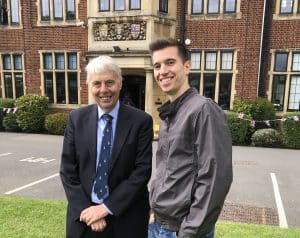 When he stopped by for the Founder’s Day Fete in June, he found it “a source of great satisfaction to see how well the School was doing”.
When he stopped by for the Founder’s Day Fete in June, he found it “a source of great satisfaction to see how well the School was doing”.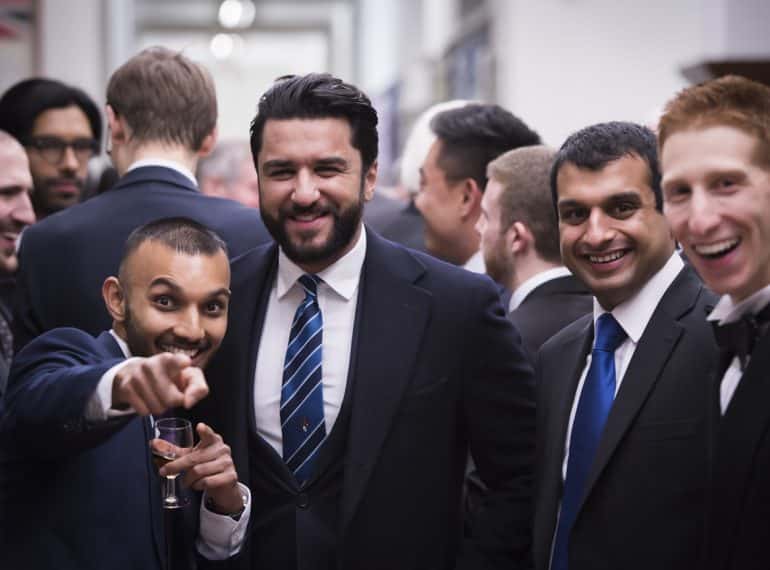
 Headmaster Neil Enright said: “I am thrilled to be able to announce the launch of QE Connect and pleased to see that our OEs are quick off the mark: many have already signed up!
Headmaster Neil Enright said: “I am thrilled to be able to announce the launch of QE Connect and pleased to see that our OEs are quick off the mark: many have already signed up!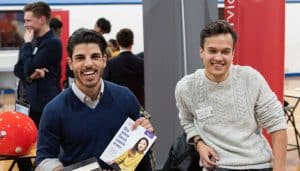 “We aspire for our boys to go to the world’s leading universities and to have the best careers,” the Headmaster added. “Through QE Connect, our alumni and other supporters can help us give pupils every advantage while they are here, including access to the latest resources, the best facilities and the finest brains.”
“We aspire for our boys to go to the world’s leading universities and to have the best careers,” the Headmaster added. “Through QE Connect, our alumni and other supporters can help us give pupils every advantage while they are here, including access to the latest resources, the best facilities and the finest brains.”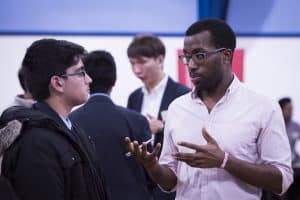 The Headmaster added: “Many of our pupils are the first generation in their families to go to university and on into professional careers; they do not have the network of family and other connections typically enjoyed by pupils from fee-paying schools. QE Connect will assist the School in broadening boys’ horizons and in overcoming this gap by putting them in touch with their predecessors at the School.
The Headmaster added: “Many of our pupils are the first generation in their families to go to university and on into professional careers; they do not have the network of family and other connections typically enjoyed by pupils from fee-paying schools. QE Connect will assist the School in broadening boys’ horizons and in overcoming this gap by putting them in touch with their predecessors at the School.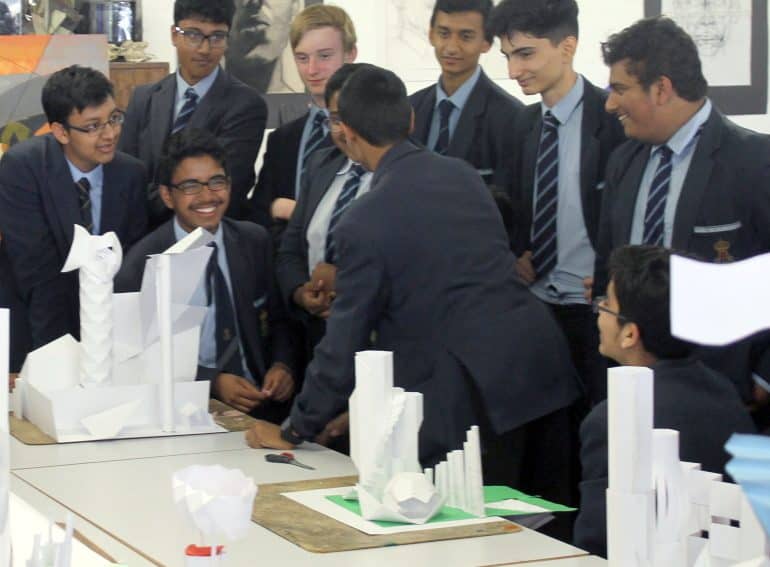
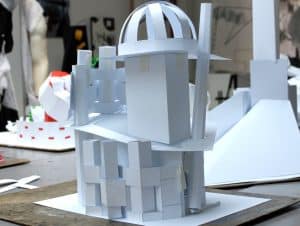 All 180 members of Year 10 were involved in the competition, which was held by the Art department as part of QE’s Enrichment Week.
All 180 members of Year 10 were involved in the competition, which was held by the Art department as part of QE’s Enrichment Week.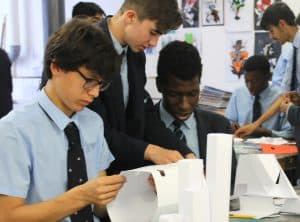 The entries created over the two days included models of museums, airports and mosques.
The entries created over the two days included models of museums, airports and mosques.